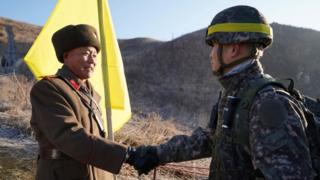North Korea condemns latest US sanctions
North Korea has denounced the latest US sanctions, saying they could “block the path to denuclearisation on the Korean peninsula forever”.
Washington said it put the sanctions on three top officials, after a report threw up a raft of human rights abuses.
A historic summit between the nations’ leaders this summer appeared to point the path towards better relations.
The period since then has seen North Korea engage both in angry exchanges and actions that have reduced tension.
There have been suggestions of a second leaders’ summit. Although President Donald Trump has indicated he is open to the idea he said this week that he was in no hurry.
What has North Korea said?
In a statement, the North Korean administration expressed “shock and indignation” at the new US sanctions.
The statement carried by the North Korean news agency KCNA accused the US state department of being “bent on bringing… relations back to the status of last year which was marked by exchanges of fire”.
In the verbal exchanges last year, President Donald Trump called North Korean leader Kim Jong-un a “little rocket man” whose threats would be “met with fire and fury like the world has never seen”. Among the North’s many rebukes, it called Mr Trump an “old lunatic”.
The latest North Korean statement said the US policy of “maximum pressure” would be its “greatest miscalculation” and that it should instead return to the confidence building that was hoped for following the leaders’ summit in Singapore.
What are the new sanctions?
They followed a state department report on the North that is regularly required by Congress.
The US vowed to seize the US assets of Mr Kim’s right-hand man, Choe Ryong-hae, and two others, security minister Jong Kyong-thaek and propaganda official Pak Kwang-ho.
State department spokesman Robert Palladino said: “Human rights abuses in North Korea remain among the worst in the world and include extrajudicial killings, forced labour, torture, prolonged arbitrary detention, rape, forced abortions and other sexual violence.”
What has happened since Singapore?
At the June summit, the two leaders signed an agreement to work towards the denuclearisation of the peninsula. But it did not include a timeline, details or any mechanisms to verify the process.
Since the summit, there have been some successes, but most notably in inter-Korean relations.
Only this week, North and South Korean soldiers made several friendly crossings into each other’s territory for the first time since the countries were divided, checking the dismantling of guard posts in the Demilitarised Zone (DMZ).
US-North Korea relations are more stalled.
Working-level talks between Secretary of State Mike Pompeo and North Korea’s Kim Yong-chol were cancelled abruptly in November and have not been rescheduled.
Personal ties between the leaders appear relatively unaffected, if somewhat unpredictable.
In September, Mr Trump praised a “very warm” letter from Mr Kim on a follow-up summit.
But, as the BBC’s Laura Bicker in Seoul points out, the insurmountable obstacle remains – the North’s nuclear weapons.
The US maintains it will never allow an agreement to formally end the Korean war, nor will it lift economic sanctions imposed upon the North, while the Kim administration poses a nuclear threat.
Source: Read Full Article



